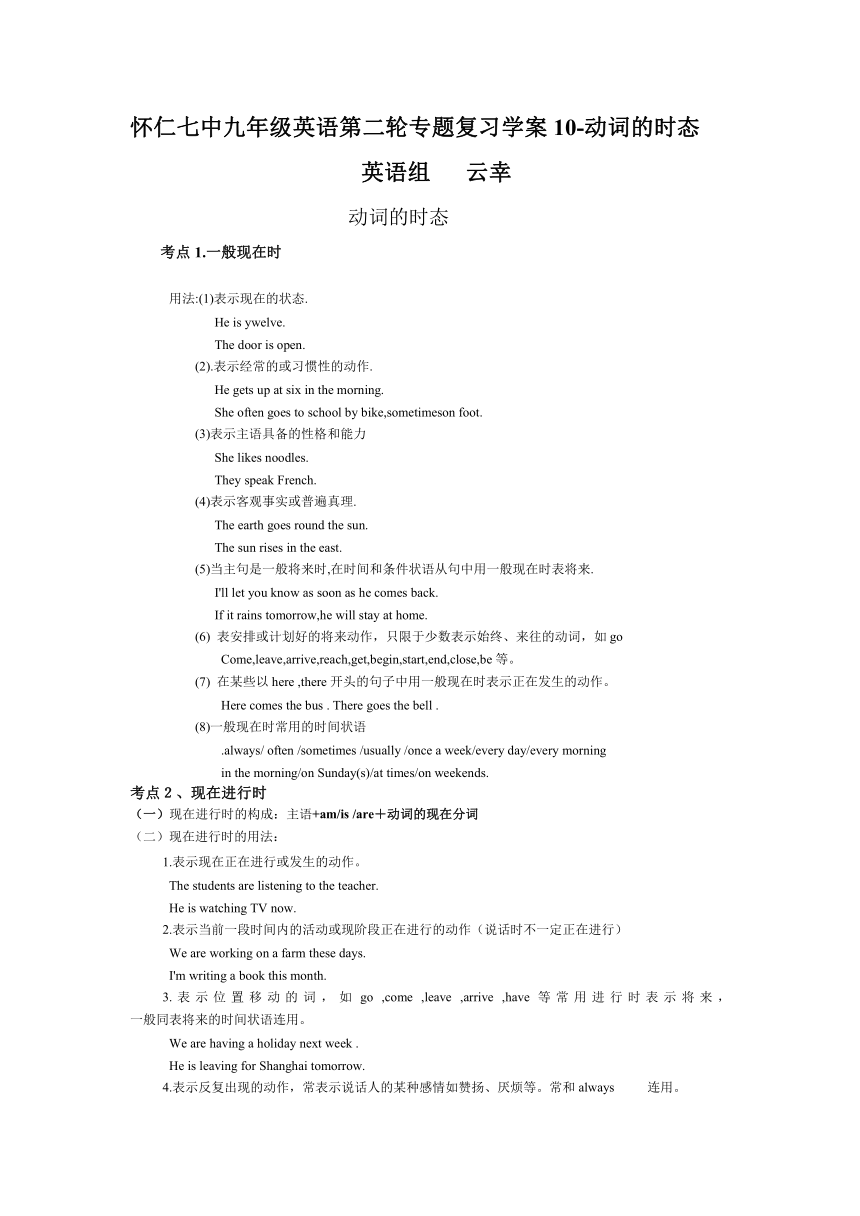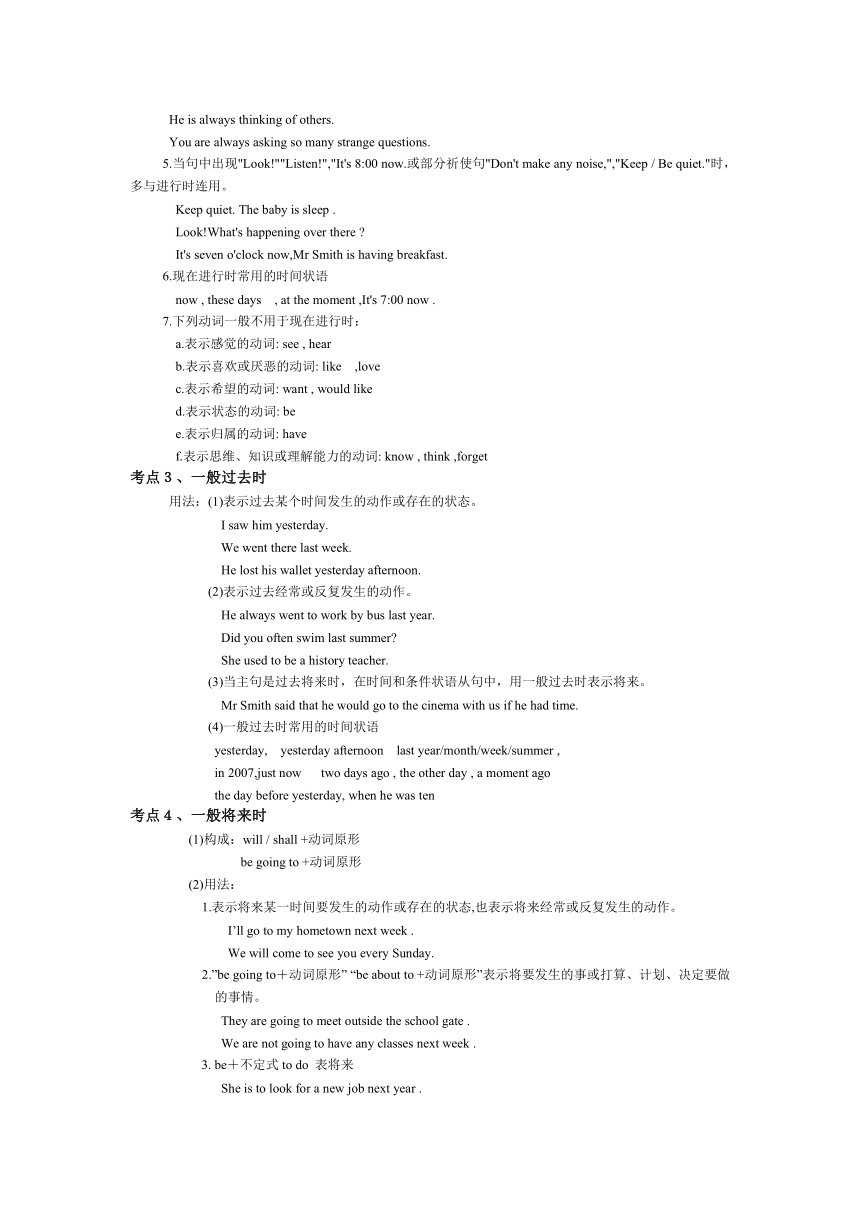怀仁七中九年级英语第二轮专题复习学案-动词的时态
文档属性
| 名称 | 怀仁七中九年级英语第二轮专题复习学案-动词的时态 |  | |
| 格式 | zip | ||
| 文件大小 | 17.9KB | ||
| 资源类型 | 教案 | ||
| 版本资源 | 通用版 | ||
| 科目 | 英语 | ||
| 更新时间 | 2014-03-12 18:02:00 | ||
图片预览


文档简介
怀仁七中九年级英语第二轮专题复习学案10-动词的时态
英语组 云幸
动词的时态
考点1.一般现在时
用法:(1)表示现在的状态.
He is ywelve.
The door is open.
(2).表示经常的或习惯性的动作.
He gets up at six in the morning.
She often goes to school by bike,sometimeson foot.
(3)表示主语具备的性格和能力
She likes noodles.
They speak French.
(4)表示客观事实或普遍真理.
The earth goes round the sun.
The sun rises in the east.
(5)当主句是一般将来时,在时间和条件状语从句中用一般现在时表将来.
I'll let you know as soon as he comes back.
If it rains tomorrow,he will stay at home.
(6) 表安排或计划好的将来动作,只限于少数表示始终、来往的动词,如go
Come,leave,arrive,reach,get,begin,start,end,close,be等。
(7) 在某些以here ,there开头的句子中用一般现在时表示正在发生的动作。
Here comes the bus . There goes the bell .
(8)一般现在时常用的时间状语
.always/ often /sometimes /usually /once a week/every day/every morning
in the morning/on Sunday(s)/at times/on weekends.
考点2、现在进行时
现在进行时的构成:主语+am/is /are+动词的现在分词
现在进行时的用法:
1.表示现在正在进行或发生的动作。
The students are listening to the teacher.
He is watching TV now.
2.表示当前一段时间内的活动或现阶段正在进行的动作(说话时不一定正在进行)
We are working on a farm these days.
I'm writing a book this month.
3.表示位置移动的词,如go ,come ,leave ,arrive ,have等常用进行时表示将来, 一般同表将来的时间状语连用。
We are having a holiday next week .
He is leaving for Shanghai tomorrow.
4.表示反复出现的动作,常表示说话人的某种感情如赞扬、厌烦等。常和always 连用。
He is always thinking of others.
You are always asking so many strange questions.
5.当句中出现"Look!""Listen!","It's 8:00 now.或部分祈使句"Don't make any noise,","Keep / Be quiet."时,多与进行时连用。
Keep quiet. The baby is sleep .
Look!What's happening over there
It's seven o'clock now,Mr Smith is having breakfast.
6.现在进行时常用的时间状语
now , these days , at the moment ,It's 7:00 now .
7.下列动词一般不用于现在进行时:
a.表示感觉的动词: see , hear
b.表示喜欢或厌恶的动词: like ,love
c.表示希望的动词: want , would like
d.表示状态的动词: be
e.表示归属的动词: have
f.表示思维、知识或理解能力的动词: know , think ,forget
考点3、一般过去时
用法:(1)表示过去某个时间发生的动作或存在的状态。
I saw him yesterday.
We went there last week.
He lost his wallet yesterday afternoon.
(2)表示过去经常或反复发生的动作。
He always went to work by bus last year.
Did you often swim last summer
She used to be a history teacher.
(3)当主句是过去将来时,在时间和条件状语从句中,用一般过去时表示将来。
Mr Smith said that he would go to the cinema with us if he had time.
(4)一般过去时常用的时间状语
yesterday, yesterday afternoon last year/month/week/summer ,
in 2007,just now two days ago , the other day , a moment ago
the day before yesterday, when he was ten
考点4、一般将来时
(1)构成:will / shall +动词原形
be going to +动词原形
(2)用法:
1.表示将来某一时间要发生的动作或存在的状态,也表示将来经常或反复发生的动作。
I’ll go to my hometown next week .
We will come to see you every Sunday.
2.”be going to+动词原形” “be about to +动词原形”表示将要发生的事或打算、计划、决定要做的事情。
They are going to meet outside the school gate .
We are not going to have any classes next week .
3. be+不定式to do 表将来
She is to look for a new job next year .
4.在表示建议或征求对方意见时,可用Shall I /we…
Shall we go at ten
It’s hot today. Shall I open the window
5.在问对方是否愿意,或表示客气的邀请或命令时,常用Will you…
Will you go out for a walk with me
Will you close the door when you go out
6.一般将来时常用的时间状语
tomorrow ,next week /year/month , this evening ,soon , in three days,some day,
in the future, from now on ,in a minute ,the day after tomorrow ,next time
考点5、过去进行时
构成:was/were + 动词现在分词
用法
1.表示在过去某一时刻或某一段时间正在进行的动作。
What were you doing this time yesterday We were working in class.
He was mending his bike at ten o’clock yesterday.
I was drowing a horse when the teacher came in .
While she was trying to pass a truck before her ,she saw another car coming.
2.过去进行时常用的时间状语
at eight last night , from 7o’clock to 9 o’clock,at this time yesterday,at that time
those days,just then , when/while引起的时间状语从句。
3.句型 肯定句;主语+ was/were + 动词现在分词+ 其它
否定句:主语+ was/were +not+ 动词现在分词+ 其它
一般疑问句:Was/Were+主语+动词现在分词+ 其它
肯定回答: Yes, 主语 +was/were 否定回答:No, 主语+wasn’t/weren’t
特殊疑问句:疑问词+ was / were +主语+动词现在分词+其它
考点6、现在完成时
构成:助动词have/has+过去分词
用法:
1.表示过去发生或已经完成的某一动作对现在造成的影响或产生的结果。
Have you had your lunch yet Yes,I have .I’ve just had it .
I have opened the door.
He has finished his homework already.
2.表示从过去开始持续到现在的动作或状态,可以和表示从过去某一时刻延续到现在的一段时间的状语连用,动词多是延续性的。
I’ve known Li Lei for three years .
They have lived here since 1996 .
How long have you worked in this factory
She has taught us since I came to this school.
3.非延续性动词与一段时间连用时可采用下述三种方法:
a.将非延续性动词转化为延续性动词
b.将时间状语改为过去时间,并用一般过去时代替现在完成时。
c.用句型It is+一段时间+since从句(从句中的谓语动词用非延续性动词的一般过去式)表示。
4.用于现在完成时的时间状语
for +一段时间 ,since +过去的时间点 ,since +从句(一般过去时)
these days ,in/during the last/past few years , so far , twice , all one’s life , already
yet ,just ,ever , never, before , over the year , ever since
非考点7、过去完成时
1.构成:助动词+动词的过去分词
2.用法: ①表示在过去某一时间以前已经发生或完成了的动作。
②表示在过去某一动作之前已经发生或完成了的动作。
③表示从过去某一时间开始持续到过去另一时间的动作或状态。
3.与过去完成时连用的时间状语:by last week ,by the end of last year ,before last week ,by then
before I got to the theatre , by the time….
非考点8、过去将来时
1.构成:would + 动词原形
was / were going to + 动词原形
2.用法:①表示从过去某一时间看将来发生的动作或存在的状态。常用在宾语从句中.
②表示曾经打算或准备要做的动作,用was / were going to + 动词原形 。
He said he would buy some fruit for his sister .
He asked when the meeting would end .
I thought it was going to rain soon .
英语组 云幸
动词的时态
考点1.一般现在时
用法:(1)表示现在的状态.
He is ywelve.
The door is open.
(2).表示经常的或习惯性的动作.
He gets up at six in the morning.
She often goes to school by bike,sometimeson foot.
(3)表示主语具备的性格和能力
She likes noodles.
They speak French.
(4)表示客观事实或普遍真理.
The earth goes round the sun.
The sun rises in the east.
(5)当主句是一般将来时,在时间和条件状语从句中用一般现在时表将来.
I'll let you know as soon as he comes back.
If it rains tomorrow,he will stay at home.
(6) 表安排或计划好的将来动作,只限于少数表示始终、来往的动词,如go
Come,leave,arrive,reach,get,begin,start,end,close,be等。
(7) 在某些以here ,there开头的句子中用一般现在时表示正在发生的动作。
Here comes the bus . There goes the bell .
(8)一般现在时常用的时间状语
.always/ often /sometimes /usually /once a week/every day/every morning
in the morning/on Sunday(s)/at times/on weekends.
考点2、现在进行时
现在进行时的构成:主语+am/is /are+动词的现在分词
现在进行时的用法:
1.表示现在正在进行或发生的动作。
The students are listening to the teacher.
He is watching TV now.
2.表示当前一段时间内的活动或现阶段正在进行的动作(说话时不一定正在进行)
We are working on a farm these days.
I'm writing a book this month.
3.表示位置移动的词,如go ,come ,leave ,arrive ,have等常用进行时表示将来, 一般同表将来的时间状语连用。
We are having a holiday next week .
He is leaving for Shanghai tomorrow.
4.表示反复出现的动作,常表示说话人的某种感情如赞扬、厌烦等。常和always 连用。
He is always thinking of others.
You are always asking so many strange questions.
5.当句中出现"Look!""Listen!","It's 8:00 now.或部分祈使句"Don't make any noise,","Keep / Be quiet."时,多与进行时连用。
Keep quiet. The baby is sleep .
Look!What's happening over there
It's seven o'clock now,Mr Smith is having breakfast.
6.现在进行时常用的时间状语
now , these days , at the moment ,It's 7:00 now .
7.下列动词一般不用于现在进行时:
a.表示感觉的动词: see , hear
b.表示喜欢或厌恶的动词: like ,love
c.表示希望的动词: want , would like
d.表示状态的动词: be
e.表示归属的动词: have
f.表示思维、知识或理解能力的动词: know , think ,forget
考点3、一般过去时
用法:(1)表示过去某个时间发生的动作或存在的状态。
I saw him yesterday.
We went there last week.
He lost his wallet yesterday afternoon.
(2)表示过去经常或反复发生的动作。
He always went to work by bus last year.
Did you often swim last summer
She used to be a history teacher.
(3)当主句是过去将来时,在时间和条件状语从句中,用一般过去时表示将来。
Mr Smith said that he would go to the cinema with us if he had time.
(4)一般过去时常用的时间状语
yesterday, yesterday afternoon last year/month/week/summer ,
in 2007,just now two days ago , the other day , a moment ago
the day before yesterday, when he was ten
考点4、一般将来时
(1)构成:will / shall +动词原形
be going to +动词原形
(2)用法:
1.表示将来某一时间要发生的动作或存在的状态,也表示将来经常或反复发生的动作。
I’ll go to my hometown next week .
We will come to see you every Sunday.
2.”be going to+动词原形” “be about to +动词原形”表示将要发生的事或打算、计划、决定要做的事情。
They are going to meet outside the school gate .
We are not going to have any classes next week .
3. be+不定式to do 表将来
She is to look for a new job next year .
4.在表示建议或征求对方意见时,可用Shall I /we…
Shall we go at ten
It’s hot today. Shall I open the window
5.在问对方是否愿意,或表示客气的邀请或命令时,常用Will you…
Will you go out for a walk with me
Will you close the door when you go out
6.一般将来时常用的时间状语
tomorrow ,next week /year/month , this evening ,soon , in three days,some day,
in the future, from now on ,in a minute ,the day after tomorrow ,next time
考点5、过去进行时
构成:was/were + 动词现在分词
用法
1.表示在过去某一时刻或某一段时间正在进行的动作。
What were you doing this time yesterday We were working in class.
He was mending his bike at ten o’clock yesterday.
I was drowing a horse when the teacher came in .
While she was trying to pass a truck before her ,she saw another car coming.
2.过去进行时常用的时间状语
at eight last night , from 7o’clock to 9 o’clock,at this time yesterday,at that time
those days,just then , when/while引起的时间状语从句。
3.句型 肯定句;主语+ was/were + 动词现在分词+ 其它
否定句:主语+ was/were +not+ 动词现在分词+ 其它
一般疑问句:Was/Were+主语+动词现在分词+ 其它
肯定回答: Yes, 主语 +was/were 否定回答:No, 主语+wasn’t/weren’t
特殊疑问句:疑问词+ was / were +主语+动词现在分词+其它
考点6、现在完成时
构成:助动词have/has+过去分词
用法:
1.表示过去发生或已经完成的某一动作对现在造成的影响或产生的结果。
Have you had your lunch yet Yes,I have .I’ve just had it .
I have opened the door.
He has finished his homework already.
2.表示从过去开始持续到现在的动作或状态,可以和表示从过去某一时刻延续到现在的一段时间的状语连用,动词多是延续性的。
I’ve known Li Lei for three years .
They have lived here since 1996 .
How long have you worked in this factory
She has taught us since I came to this school.
3.非延续性动词与一段时间连用时可采用下述三种方法:
a.将非延续性动词转化为延续性动词
b.将时间状语改为过去时间,并用一般过去时代替现在完成时。
c.用句型It is+一段时间+since从句(从句中的谓语动词用非延续性动词的一般过去式)表示。
4.用于现在完成时的时间状语
for +一段时间 ,since +过去的时间点 ,since +从句(一般过去时)
these days ,in/during the last/past few years , so far , twice , all one’s life , already
yet ,just ,ever , never, before , over the year , ever since
非考点7、过去完成时
1.构成:助动词+动词的过去分词
2.用法: ①表示在过去某一时间以前已经发生或完成了的动作。
②表示在过去某一动作之前已经发生或完成了的动作。
③表示从过去某一时间开始持续到过去另一时间的动作或状态。
3.与过去完成时连用的时间状语:by last week ,by the end of last year ,before last week ,by then
before I got to the theatre , by the time….
非考点8、过去将来时
1.构成:would + 动词原形
was / were going to + 动词原形
2.用法:①表示从过去某一时间看将来发生的动作或存在的状态。常用在宾语从句中.
②表示曾经打算或准备要做的动作,用was / were going to + 动词原形 。
He said he would buy some fruit for his sister .
He asked when the meeting would end .
I thought it was going to rain soon .
同课章节目录
- 词法
- 名词
- 动词和动词短语
- 动词语态
- 动词时态
- 助动词和情态动词
- 非谓语动词
- 冠词
- 代词
- 数词和量词
- 形容词副词及其比较等级
- 介词和介词短语
- 连词和感叹词
- 构词法
- 相似、相近词比较
- 句法
- 陈述句
- 一般疑问句和否定疑问句
- 特殊疑问句及选择疑问句
- 反意疑问句
- 存在句(There be句型)
- 宾语从句
- 定语从句
- 状语从句
- 主谓一致问题
- 简单句
- 并列句
- 复合句
- 主谓一致
- 主、表语从句
- 名词性从句
- 直接引语和间接引语
- 虚拟语气
- 感叹句
- 强调句
- 倒装句
- 祈使句
- 句子的成分
- 句子的分类
- 题型专区
- 单项选择部分
- 易错题
- 完形填空
- 阅读理解
- 词汇练习
- 听说训练
- 句型转换
- 补全对话
- 短文改错
- 翻译
- 书面表达
- 任务型阅读
- 语法填空
- 其他资料
